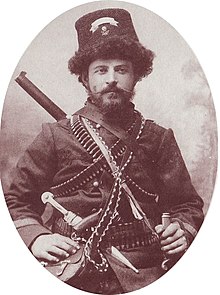| Revision as of 17:31, 9 April 2017 edit5.13.134.218 (talk)No edit summary← Previous edit | Revision as of 18:10, 9 April 2017 edit undo46.238.25.84 (talk) Rv.Not related to Guli. Hi was Bulgarophile.Tag: references removedNext edit → | ||
| Line 24: | Line 24: | ||
| ] | ] | ||
| In March 1903, he began commanding a revolutionary squad, crossing the Bulgarian-Ottoman border heading for ]. From April to August 1903, he trained and prepared his troops for the upcoming ]. He died in |
In March 1903, he began commanding a revolutionary squad, crossing the Bulgarian-Ottoman border heading for ]. From April to August 1903, he trained and prepared his troops for the upcoming ]. He died in Krusevo. | ||
| Following the revolt, Romania, with the support of Austro-Hungary, succeeded in the acceptance of Vlachs as a separate ] with the decree (]) of May 22, 1905 by Sultan Abdulhamid, so the "Ullah millet" (the millet of the Vlachs) could have their own churches and schools<ref>Thede Kahl, Ethnologia Balkanica, Vol. 6 (2002), p. 148</ref> | |||
| ==Legacy== | ==Legacy== | ||
Revision as of 18:10, 9 April 2017
| This article needs additional citations for verification. Please help improve this article by adding citations to reliable sources. Unsourced material may be challenged and removed. Find sources: "Pitu Guli" – news · newspapers · books · scholar · JSTOR (March 2014) (Learn how and when to remove this message) |
| Pitu Guli Питу Гули | |
|---|---|
 | |
| Born | 1865 Krusevo, Ottoman Empire (now the Republic of Macedonia) |
| Died | August 12th, 1903 Krusevo, Ottoman Empire |
| Monuments | Mečkin Kamen |
| Other names | Pitu the Vlach |
| Organization | Internal Macedonian Revolutionary Organization (IMRO) |
Pitu Guli (Cyrillic: Питу Гули; 1865–1903) was an Aromanian revolutionary in Ottoman Macedonia, a local leader of what is commonly referred to as the Internal Macedonian Revolutionary Organization (IMRO).
Life
Born to a poor family in Kruševo, he demonstrated an independent and rebellious nature early in life. He left his home in Macedonia at the age of 17 in search of wealth in the Bulgarian capital, Sofia. In 1885, he returned to Macedonia, as part of a rebel squad of the revolutionary movement against the Ottoman Empire, led by Adam Kalmikov. He was captured and exiled to eastern Anatolia for a period of eight years, seven years of which were spent in the prison in Trabzon. In 1895, he again returned to Kruševo and became a member of IMARO. From this time on, he was fully committed to the independence of Macedonia from Turkish rule. In 1902, he once again traveled to Bulgaria. On his return to Macedonia, he was injured at the border and was forced to turn back.

In March 1903, he began commanding a revolutionary squad, crossing the Bulgarian-Ottoman border heading for Kruševo. From April to August 1903, he trained and prepared his troops for the upcoming Ilinden Uprising. He died in Krusevo.
Legacy
Pitu Guli is father of Tashko Gulev (Shula Guli), who died in 1918 as soldier of the Bulgarian 11th Macedonian Infantry Division and of the revolutionary of IMRO Nikola Gulev (Lakia Guli), one of the people closest to Todor Alexandrov, killed by Serbian police in 1924. Pitu Guli is also a father of Steryo Gulev (Sterya Guli), who took part in the military units formed by the Bulgarian authorities in Vardar Macedonia during World War II to fight the communist partisans. He reportedly shot himself after Bulgarian withdrawal from Macedonia in 1944, upon the arrival of Tito's partisans in Kruševo in despair over what he saw as a second period of Serbian dominance in Macedonia.
Pitu Guli is a national hero in the Republic of Macedonia and Bulgaria, and remembered as having fought heroically at Mečkin Kamen (Bear's Rock) near Kruševo, where he was killed during the Ilinden Uprising in defense of the Macedonian Kruševo Republic. A Macedonian Partisan Brigade was named after him. He is also celebrated in folk songs and poetry throughout the region of Macedonia, being mentioned in the national anthem of the Republic of Macedonia (Today over Macedonia).
References
- Brown, K. (2003) The Past in Question: Modern Macedonia and the Uncertainties of Nation (Princeton: Princeton University Press) ISBN 0-691-09995-2
- Македонска енциклопедија, МАНУ, Скопје, 2009, стр. 415-416.
- Historical Dictionary of the Republic of Macedonia, Dimitar Bechev, Scarecrow Press, 2009, ISBN 0810862956, p. 91.